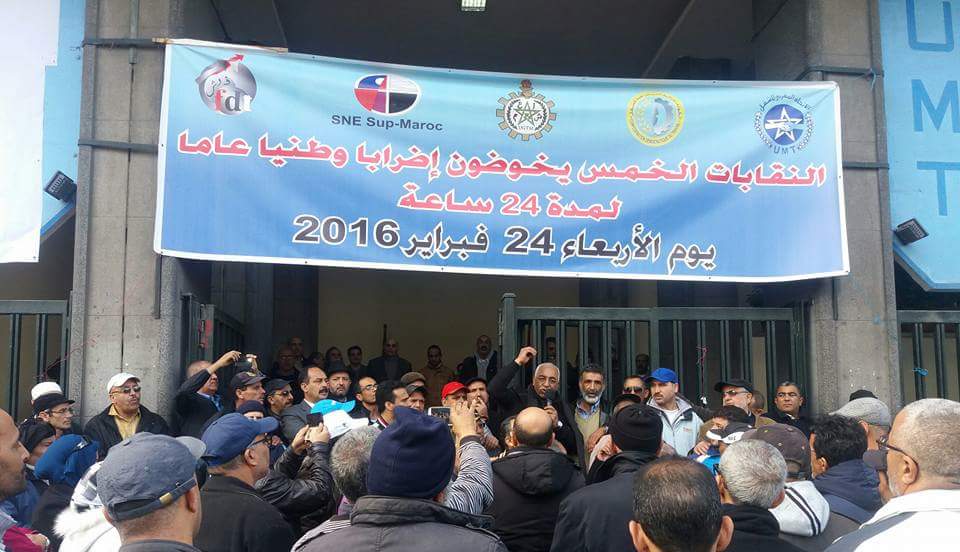
Feb 25, 2016
Hundreds of thousands of public- and private-sector workers waged a massive national strike throughout Morocco yesterday to protest the government’s unilateral approach on pension reforms, including moves to increase the retirement age, and its unwillingness to engage in dialogue with unions. Nearly 85 percent of workers joined the strike, according to union federations whose members took part, with teachers, health care workers, local government employees and port workers turning out in force.
“The strike is a message to alert the government to the seriousness of the current social situation and to meet the demands of the working class,” says Mohamed Atif, communications officer for the Democratic Labor Confederation (CDT). The unions, whose members hold a sixth of the seats in parliament, say they will block a government draft bill making pension changes.
Workers took the action after repeated calls by unions to begin negotiations went unheeded. Unions say they want to draw attention to the deteriorating economic conditions of Morocco’s working class, made worse by government’s halt to fuel subsides and violations of worker rights, including the right to strike.
The 24-hour strike included banks; postal and telecommunications services; the energy, electricity and water sectors; agriculture and fisheries; ground transportation; construction; mining; hotels, restaurants, call centers and more.
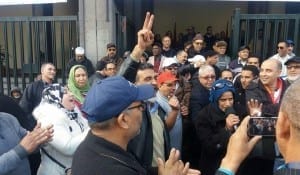
Credit: Hicham Ahmadouch/UMT
Unions called on airport workers, emergency health workers and others in key sectors to stay on the job but to wear red armbands in a show of solidarity with strikers.
Moroccan workers received widespread international support for their walkout, with theInternational Trade Union Confederation (ITUC) calling on the government to have a meaningful dialogue with unions.
“The Moroccan government is refusing to listen to its own people—the women and men who create wealth and sustain society and the economy,” says ITUC General Secretary Sharan Burrow. “The ITUC calls on the government to step back from its anti-social and confrontational approach, and have a meaningful dialogue with the unions.”
The IUF, the global union for food workers, denounced the government’s lack of willingness to negotiate with workers and called for greater respect for basic democratic principles and the rights of unions.
In addition to the CDT, major federations calling the strike include the Moroccan Labor Union (UMT), the General Union of Workers of Morocco (UGTM) and the Democratic Labor Federation (FDT). The National Union of Higher Education (SNEsup) also played a big role.
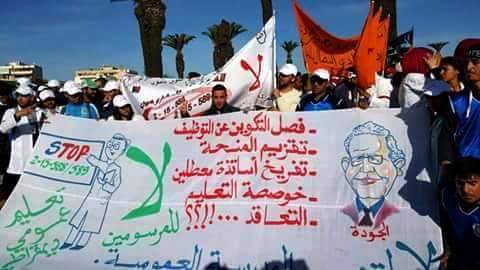
Jan 27, 2016
Thousands of teacher trainees, holding banners reading “Marching for dignity and justice,” and chanting “We’re prepared to go to prison,” marched through the streets of Morocco’s capital, Rabat, this week to denounce two government decrees to cut scholarships and jobs.
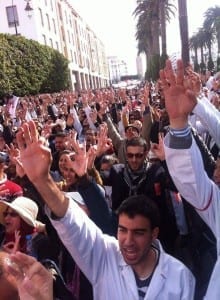
Teacher trainees defied government threats barring them from public protest. Credit: Hicham Ahmadouch/UMT
The protest followed a meeting between representatives of the teacher trainees and the government, which refused to annul the two decrees but agreed to recruit an additional 3,000 teacher trainers not covered by the 2016 fiscal year budget.
The workers, who have been on strike for two months, took to the streets despite government threats against unauthorized marches. At a rally earlier this month, several teacher trainees were beaten by police. Primarily in the their 20s and 30s, teacher trainees say the government’s decrees will further fuel the country’s already high youth unemployment rate, which, at more than 20 percent, is double the nation’s overall unemployment rate.
Morocco’s head of government, Abdelilah Benkirane, asserted that he will not “repeal the government decrees,” regarding teacher trainees.
Earlier this month, some 4,000 workers staged a sit-in outside the parliament in Rabat to protest worker cutbacks in pensions and ongoing worker rights violations, including the attacks on the teacher trainees.
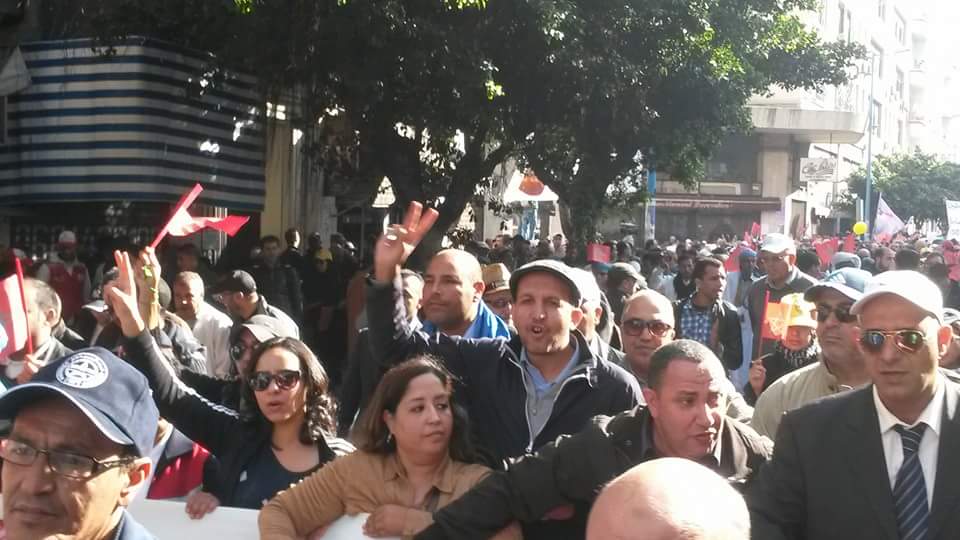
Dec 11, 2015
Thousands of public-sector employees rallied and marched as part of a national strike yesterday in which workers in local agencies and up to 80 percent in government ministries walked off the job. Workers seek to draw attention to the unwillingness of the government to negotiate with them on such issues as wages and retirement.
The strike, held on International Human Rights Day, aimed to “defend the gains of retirement for workers, trade union freedoms, rights and dignity,” according to a joint statement by the four unions that called for the action.
Members of the Moroccan Labor Union (Union Marocaine du travail), the Democratic Confederation for Labor (Confédération démocratique du travail), the General Union of Moroccan Workers (Union Generale des Travailleurs du Maroc) and the Democratic Federation for Labor (Fédération démocratique du travail) also denounced the government’s unilateral decisions in the absence of social dialogue and the unilateral approach for the retirement reform.
Union members have sought enforcement of an agreement made in April 2011 with the previous government that improved civil servants’ salaries, boosted the minimum pension and promoted union freedom. The national strike follows a November 29 action in which tens of thousands of workers from all four unions rallied and marched to call attention to how the government’s inaction has eroded their ability to support their families. Workers also took part in a month of protest in May, and say they are planning another national strike in coming weeks.
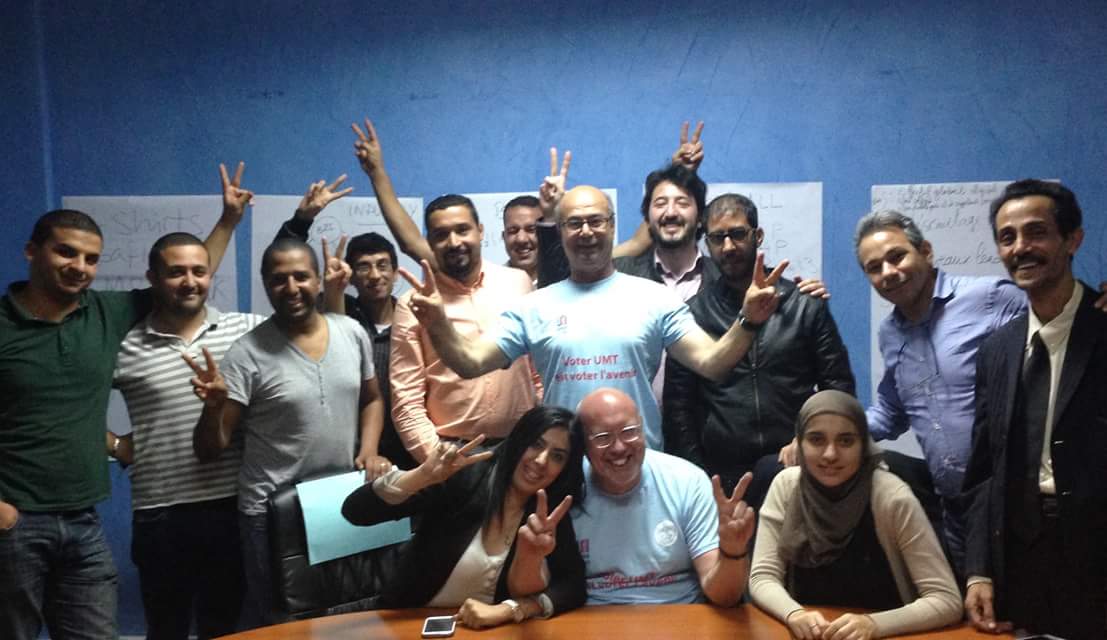
Jun 29, 2015
Some 13,700 workers won collective bargaining rights at 11 call centers across Morocco, a major victory for the country’s union movement that culminates a three-year effort to help call center workers form a union. Elections took place between June 1 and June 10, and the results were announced late last week.
The Union Marocaine du Travail (Moroccan Labor Union, UMT) also won the right to represent all the country’s workers at the national level with employers and the government—a “tripartite social dialogue” process that addresses issues such as benefits and minimum wages. In these national negotiations, union representatives will negotiate on issues specific to the approximately 100,000 call center workers in Morocco.
Next Step: Bargaining
Describing the win as an “historic breakthrough,” the UMT says in a statement that the next step is to negotiate with employers and the government to achieve an industry-wide collective bargaining agreement. The Solidarity Center and UNI Global Union allied with the UMT to support the campaign with training and other resources.
In Morocco, worker delegate elections are held every six years. More than 35 percent of the worker delegates elected at the 11 call centers are union affiliated, giving the UMT the right to negotiate collective bargaining agreements at each worksite. Moroccan law requires at least 35 percent support for union representation at a worksite.
The call center industry, comprised of mostly young workers, a majority of whom are women, is part of the country’s growing offshoring sector. Morocco is now among the top 30 offshore destinations for call centers, business process outsourcing and information technology outsourcing.
Agriculture Workers Won Bargaining in January
The UMT is one of four union federations that will represent workers in national dialogue. The others are the Confédération Démocratique du Travail (Democratic Labor Confederation, CDT); the Union Générale des Travailleurs du Maroc (General Union of Moroccan Workers, UGTM; and the Union Nationale du Travail au Maroc (National Union of Moroccan Workers, UNTM).
In another major victory for Moroccan workers earlier this year, the CDT and the agro-industry employer, Les Domaines Brahim Zniber, signed a collective bargaining agreement that covers nearly 1,000 agricultural workers on five large farms in Morocco’s fertile Meknes region.
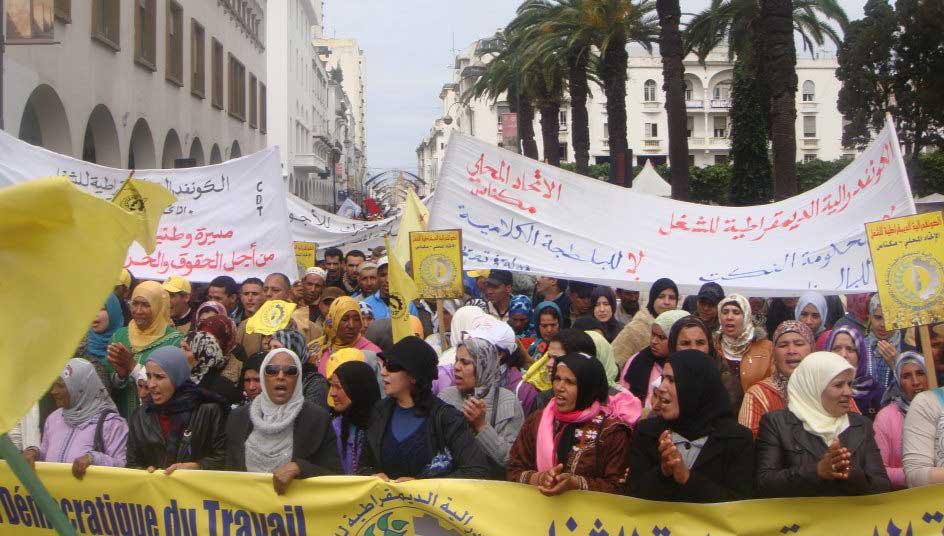
May 1, 2015
Workers in Bahrain, Burundi, Morocco, Swaziland and Turkey are standing strong in the face of economic and political threats this May Day.
May 1 is generally a time when workers around the world celebrate the dignity of work and working people’s social and economic achievements. But this year, governments in some countries have banned May Day celebrations, while elsewhere, workers are forced to protest lack of progress in attaining their share of economic prosperity.
Working women and men are undaunted by intimidation and, in some cases, risking their lives to exercise their freedom to gather in the public space and stand up for their rights. This year more than ever, May Day stands as a beacon for internationally recognized human and labor rights. Here’s a roundup.
Bahrain: The government on April 30 banned all May 1 rallies, forcing the General Federation of Bahrain Trade Unions (GFBTU) to abruptly cancel its weekend celebrations. The federation had planned a rally, medical camps, family outings and award ceremonies focusing on the rights of women and migrant workers in the workplace. Thousands were expected to attend the rally, including members of more than 45 GFBTU-affiliated trade unions.
Burundi: Hundreds of journalists and human rights activists have been arrested and Internet has been inaccessible in the capital, Bujumbura, in recent days following protests against the re-election bid of President Pierre Nkurunziza. Some journalists have been “beaten up and workplaces forced to close down,” one journalist told allAfrica. Civil society organizations and political movements have been denied the right to hold public meetings and assemblies. The Confédération Syndicale du Burundi (COSYBU) and the Organization of Free Unions of Burundi (CSB) cancelled May 1 festivities because of the country’s insecurity.
Morocco: The Moroccan union movement is boycotting May 1 celebrations and instead turning May into a month of protest. The Moroccan Labor Union (Union Marocaine de Travail), the Democratic Confederation for Labor (Confédération Démocratique du Travail) and the Democratic Federation for Labor (Fédération Démocratique du Travail) and others will protest the lack of movement in improving civil servants’ salaries, increasing the minimum wage and boosting minimum pension, per an agreement with the government in April 2011.
Swaziland: Despite a ban on May Day rallies, the Trade Union Congress of Swaziland (TUCOSWA) is encouraging members to turn out and “celebrate their day and not be prevented by actions that are at best unlawful.” Police announced that only “recognized unions” will be allowed to mark May Day. The authorities have refused to recognize TUCOSWA, and police have repeatedly broken up TUCOSWA meetings this year, injuring at least one union leader. “Our members are geared for their celebrations and will not be prevented by threats from the police,” says TUCOSWA Secretary-General Vincent Ncongwane.
Some Swazi pro-democracy activists and trade unionists have been imprisoned. Sign a LaborStart petition demanding their release. If you Tweet, use the hashtag #SwaziJustice.
Turkey: After hundreds of workers defied a ban on May Day rallies in Istanbul, riot police fired tear gas and water cannon on protestors in the city’s central Taksim Square. Unions had called on the government to lift its ban on “illegal demonstrations,” in Taksim. Much of Istanbul’s public transport is shut down and police helicopters are circling over the city.







